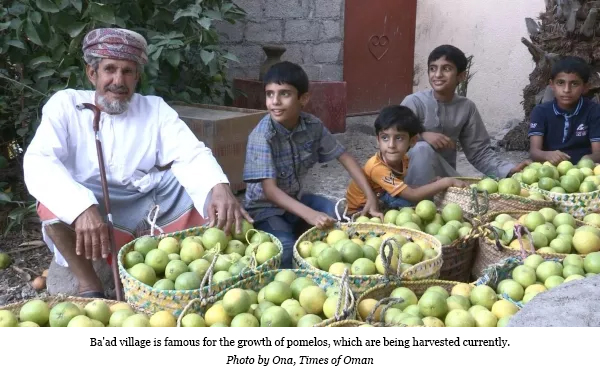by Ona, Times of Oman
Ba’ad village in the wilayat of Al Mudhaibi in the Governorate of North Al Sharqiyah is one of the most important agricultural villages in Oman, thanks to the high fertility of its soil and availability of fresh water.

Ba’ad village is famous for the growth of pomelo, which are being harvested currently.
Said bin Salim Al Meherzi, a citizen, said villagers began paying attention to growing pomelo decades ago and they are in constant contact with agriculturists.
In recent years, their attention has significantly turned towards pomelo due to the high returns their sales generate, as well as the appropriate conditions (soil, water and weather) that have helped expand the growth of pomelo.
There are two types of pomelo grown in Ba’ad village: Al Da’iri or the “round in shape”, and “Al Yahmadi”. Both types have achieved remarkable success for many years.
As for the sale and marketing of pomelo, Al Meherzi said this crop is sold in various markets across the Sultanate, especially those in the neighbouring villages of Ba’ad, whether in the same wilayat or the wilayat of Ibra in the Governorate of North Al Sharqiyah. Some pomelo markets are located in Nizwa in the Governorate of Al Dakhiliyah.
It lowers blood pressure
Al Meherzi said pomelo have significant benefits perceived by many citizens, and these benefits have boosted demand by consumers during this period.
Pomelo are good for lowering blood pressure and diabetes. They are also considered good for various organs of the human body, such as the liver.
Al Meherzi said people in the past used the skin of pomelo, after drying and crushing it, to mix it with milk for the treatment of infections against various diseases.
He added: “Given the importance of the crop being considered an important economic return for villagers, interest in growing pomelo continues. Departments of agricultural development have paid constant attention to pomelo trees as the tree has suffered over the past years from diseases, which have resulted in losing large quantities of infected fruit. Though the disease is still there, but it is very much contained.”
As for the role of the Ministry of Agriculture in protecting the crop, agricultural engineer Mohammed bin Ahmed Al Shabibi from the Agricultural Development Department in the Niyabat of Samad Al Shan told the Oman News Agency (ONA) that the Ministry of Agriculture and Fisheries pays special attention to the pomelo crop.
He added that technicians from the Agricultural Development Department make field visits to raise awareness among farmers on the diseases that hit the crop and to control them, in addition to determining the appropriate pesticide and duration of use, as well as the needs of the crop for fertiliser and training on pruning, or the selective removal of parts of a plant, such as branches, buds, or roots.
Source: Times of Oman
